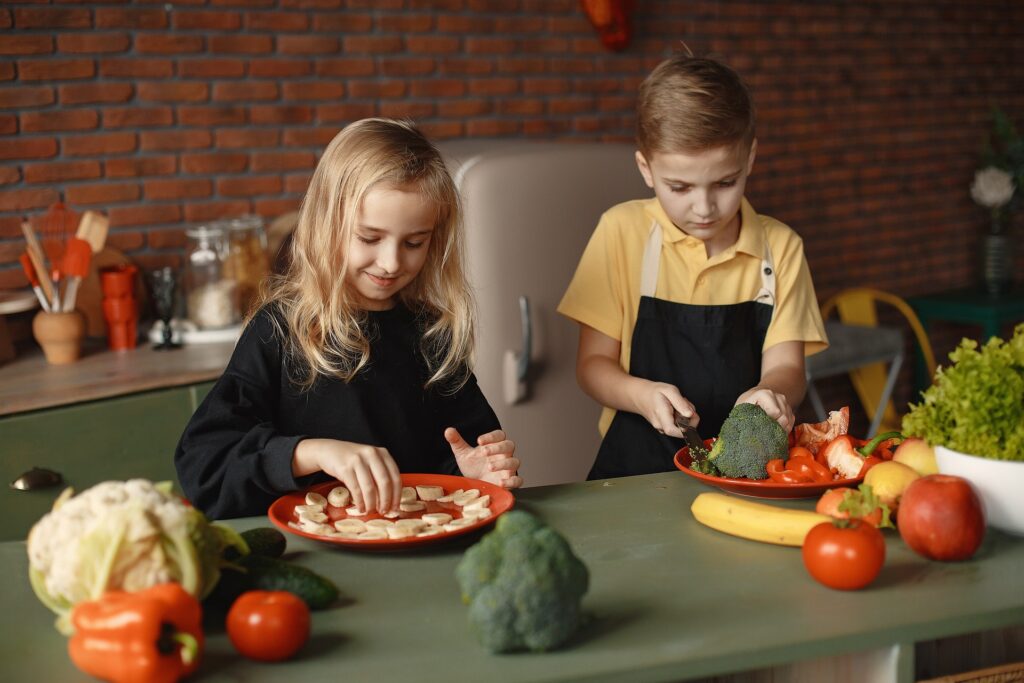As parents, we want our kids to be well-mannered. The difficulty is how to install good manners in a meaningful way that will stick with the kids. It is critical to address the heart behind training these kids because if you don’t develop a strong heart as a parent, you won’t be able to raise well-mannered kids.
While manners are commonly associated with social etiquette, they extend beyond that. You’ve probably observed how young toddlers learn actions and acquire habits. They imitate what they observe from their parents and around them, whether good or bad.
That is why it is critical to install excellent manners in kids in a way that is natural to their lifestyle.

What Are Good Manners?
Good manners are our actions to show people that we respect them. It entails being kind, attentive, and generally aware of our behaviors as we go about our everyday lives—both in public and private. Teaching children etiquette should go beyond “do’s” and “don’ts” to get to the heart of the problem.
Somewhere along the road, we reduced children’s manners to “please” and “thank you.” Don’t get me wrong: that’s an excellent starting point. However, something is lacking. Many young people today are addicted to their phones, don’t know how to shake hands properly, don’t respect their elders, and use sarcasm as their first language.
We need to return to teaching children basic civility. Why? Thereby, they are installing good manners in these kids.
Good manners and proper behavior
Knowing how to act in every given scenario is essential for good behavior. It evaluates whether activities are suitable and which actions should be carried out as needed. Similarly, healthy behavior entails engaging with others courteously and appropriately.
Manners are often the simple but significant behaviors that result in courteous and correct relationships. For example, playing video games or using your phone while at a social event is inappropriate.Instead, good behavior requires mingling and correctly connecting with others around you, making them feel seen, valued, and appreciated. Children are not born with a sense of how their actions affect others.
Our responsibility as parents is to teach kids appropriate manners in everyday situations and that those manners are closely related to how they behave.One reason this is so important is that excellent habits and etiquette in youngsters help them develop strong character. And it is their strong character that allows them to grow into respected, trustworthy adults:
A biblically based method for teaching good manners is for you to “Train up a kid in the way he should go, and he will not stray even when he is old.” 22:6 Proverbs
The True Meaning of Courtesy
Manners are more than just appropriate etiquette. Though fundamental good manners for children should entail saying please and thank you, this should not be the end of it (as it so often is).
It means being kind and caring to the people around you no matter what, and showing sympathy for those who are in need. From table manners to social etiquette, good manners are ultimately a matter of the heart. Let’s take a deeper look at manners at home and school, as these are where youngsters spend most of their time.
Household Manners
Our children’s mannerisms develop in the household. Far too many parents have handed over the duty of teaching the school system decent manners. The implications of doing so are becoming increasingly clear. That is why, now more than ever, we must teach our children proper manners at home. Children learn via observation. Thus it is our responsibility as parents to provide a positive example.
Make sure your respect and concern for others come through as you teach different methods of being polite. Good manners may become a natural part of who our children become by simply mirroring what we do. You may also show them a quick reference chart to help them remember their manners. When children are taught good manners at home, it develops a habit that naturally flows and spreads to other aspects of their lives, which is beneficial to all.
The advantages of excellent manners do not stop there
- Wake up early in the morning
- Greet your parents by saying good morning
- Brush your teeth in the morning and before bed
- Arrange your school bag according to time table
- Take your bath with soap and apply cream
- Dress up yourself in a neat and properly ironed uniform
- Comb your hair
- Take your breakfast, and eat light and healthy food.
- Polish and brush your shoes. Shining shoes make you look smart.
- Say bye to your parents before leaving for school.
- Leave for school on time, and carry your school bag, water bottle, and lunch pack.
- Ensure you arrive at the school bus station on time
- Queue while boarding the bus. Don’t push each other.
- Don’t stand near the driver, and don’t talk to him either.
- Avoid letting your hand out of the window while on the bus.
Good School Manners
Manners are very crucial at school, whether at home or work. Common rules of etiquette should be followed all the time, like raising their hand before speaking, paying close attention, and being quiet while others work. Giving examples of what should and should not happen in various settings is the best method to teach pupils excellent manners. Making it into a role-playing game can make it more enjoyable.
You may also use these enjoyable etiquette activities to assist you in teaching them!
- Pray with folded hands in the assembly
- Stand up to greet your teacher as she enters
- Take permission from your teacher before you enter the class
- Listen to the teacher attentively in the class
- Raise your hands for permission if you want to reply or ask questions
- Pay attention to what your teacher discusses about your studies and behavior
- Don’t push desks and benches in the class.
- Play carefully in the playground, don’t pray rough.
- Share your launch if need be
- Please don’t make it in the corridor. It may disturb others
- Do not deface or damage the school properties
- Avoid littering in the class, throw the waste in the bin

Why Good Manners should be installed in kids
Children with good manners always have an edge over others, whether academically or socially. Here are some ways in which good manners benefit children:
1. Boosts Self-Esteem
Being rewarded for having good manners and seeing a positive impact on their behavior in the real world makes children feel more confident. Feeling worthy of respect is a great confidence booster.
2. Social Life
Kids that are generally rude or aggressive attract the wrong kind of crowd, whereas kids who treat their peers and friends kindly and with respect are more popular and attract more loyal people who mirror their behavior. Good manners lead to stronger and more positive relationships.
3. Better Opportunities
Well-mannered children stand out from the crowd and are handed better opportunities in their academic life and career. Polite people are likely to be employed and grow faster in their career
4. Happiness
Doing one good deed or seeing a positive response from someone gives people a sense of happiness and satisfaction, and they are likely to repeat this behavior, building a habit. Good manners result in happier children.
Good Manners You Must Teach Your Children
1. Saying ‘Please’ and ‘Thank You
This is one of the first basic manners to teach your child. The importance of saying ‘please’ when asking for something and ‘thank you’ when receiving something should be instilled in children from the start. Put this into practice at all times, so it will eventually come naturally to them.
2. Asking before Taking Anything
Children should learn to ask permission before taking anything that is not theirs, even from people like Mom and Dad. They should also be taught to return anything they have borrowed with proper thanks.
3. Saying ‘Sorry.’
Along with ‘please’ and ‘thank you,’ saying “sorry” when you have done something wrong is an important habit to instil in your child. Teach your child when and where to say sorry, and not use it casually. Empathy is a skill they have to imbibe.
4. Knocking on Doors Before Entering
Kids should be taught that privacy is paramount, especially at home. They should know that it is respectful to knock on someone’s door and ask permission before entering the room. Doing so in front of your kids will help them pick it up as a good habit.
5. Covering One’s Mouth When Sneezing or Coughing
Teach your kids to cover their mouths when they sneeze or cough. Also, teach them that picking one’s nose in public is considered rude and unpleasant. This is not only part of good manners but also of hygiene.
6. Saying ‘Excuse Me
This is yet another fundamental way for children to learn. Children are naturally impatient, so they must be taught to say ‘excuse me’ and ask permission to talk. They should also know when and how to enter a conversation without interrupting anyone.
Read the rebellious child here
7. Not Making Fun of People
This should be taught very early. If it is not, children might think it is okay to make fun of people. They should be taught that it is never okay to hurt someone’s feelings by making fun of them or bullying them in public or private.
8. Phone Etiquette
Your child should know how to talk on the phone, be silent, and listen when someone on the other end is talking. This will help him/her make a good impression on others.
9. Showing Respect to Elders
Adults have been on this earth for a longer time, and kids should be taught that experience leads to wisdom and respect. They should be taught to respect their parents, grandparents, teachers, and any other adults they meet. One way of doing this is by always serving food to the elders before the kids or giving up a seat on public transportation to an older adult while your kid is watching. They will know that showing deference to age indicates good manners.
10. Learning and Remembering People’s Names
Using and remembering someone’s name shows that you have made an effort to recognize and remember them. Teach your kid to remember a friend’s name or family member’s name by using it often with him or her.
11. Not Pointing or Staring at People
To teach your kids that pointing and staring at someone is rude, tell them that three fingers will always point back at them if they point at someone. You can use that as a base to teach them to be aware of other people’s emotional space. Asking them how it would feel if they were pointed at or stared at is a step toward getting them thinking.
Read disrespectful child here
12. Being Kind to People with Disabilities
Children are naturally curious about everything, so if they see a person with some disability, they will point and stare, ask questions loudly, or even be scared. They should be taught that people with disabilities are like everyone else and should be treated equally.
13. Being a Good Guest
Teach your kids to be considerate and polite when visiting their friends’ homes. They should know how to be adaptable to the other family’s schedule, not be stubborn or fussy with the food served, and express their preferences without being vague. Kids should also be taught to greet hosts well when visiting their homes.
14. Having a Conversation the Right Way
Children should learn that yelling, shouting, and screaming are not the right communication methods. No matter how angry or irritated they are, they should be taught to speak softly and communicate their point. You can help your child learn this by doing the same in front of them. Also, teach them to wait until the other person is done talking before taking their turn. This will also make your kids listen to you.
15. Being Compassionate and Helpful
Learning to show compassion and being helpful should become a habit for children. It will make them feel good about themselves and help them be well-liked by others. You can teach them things like holding the door open for people who have their hands full or helping parents and teachers with chores.
Read how to raise more responsible kids here
16. Learning to Share
This habit becomes very important for kids when they play with others. They should be taught that sharing is caring and to share their toys or food. You can start teaching this quality by incorporating the act of sharing when you play with them and pointing out that doing so adds to the fun.
17. Cleaning Up After Themselves
Kids can be messy eaters or not properly put away their clothes or toys after using them. To teach them the habit of cleaning up, you can teach them to rinse dishes in the sink after eating or ask them to help with household chores. They will automatically learn to clean up as time goes by.
18. Be Honest
From a young age, teach kids to be honest and not tell lies. These are core values that need to be taught to your children. Make sure that they stick to what they’ve said. If they make empty promises, sit them down and explain why it is important, to tell the truth. Be firm and tell them that honesty is the best policy. Moral development is significant from early on.
19. Establishing Eye Contact
Maintaining eye contact during a conversation indicates social confidence and respect for people. Teach this to your kids by spending quality time with them and practicing eye contact while speaking. If they learn this ability, they will grow up to have good social relationships with people.
20. Never Using Foul Language
Foul language is highly disrespectful and unpleasant. Kids should be taught never to use foul language in front of anyone, even if they have heard it on TV or outside somewhere. It is an essential habit to learn. Sit them down and explain why it is not okay to use such language.
Conclusion
Good manners are basic elements that will instil a sense of etiquette in your children and make them better human beings when they grow up. They will find it easy to get along with people, succeed at work or school, and develop good relationships with others around them. A polite, considerate child will make the best impression on the world. So, start teaching your kids these manners when they are young, itself
Read more of our articles here:https://abundanceandkiddies.com/
Shop Children’s Kitchen Kits here
Shop Kishoo Children wear here
Miniclasix Children sweaters here
Children’s Bikes and Bicycles here
